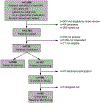Psychosocial Predictors of Glaucoma Medication Adherence Among the Support, Educate, Empower (SEE) Personalized Glaucoma Coaching Pilot Study Participants
- PMID: 32087145
- PMCID: PMC7434652
- DOI: 10.1016/j.ajo.2020.02.009
Psychosocial Predictors of Glaucoma Medication Adherence Among the Support, Educate, Empower (SEE) Personalized Glaucoma Coaching Pilot Study Participants
Abstract
Purpose: To evaluate the association between baseline psychosocial milieu and subsequent glaucoma medication adherence among participants in the Support, Educate, Empower (SEE) personalized glaucoma coaching program pilot study.
Design: Prospective cohort study.
Methods: Participants (University of Michigan glaucoma patients aged ≥40 years, taking ≥1 glaucoma medication, who self-reported poor adherence) completed a baseline survey that assessed the following: (1) demographics; (2) social network; (3) perceived stress; (4) consideration of future consequences; (5) glaucoma-related distress; and (6) social support. Medication adherence was then monitored electronically for 3 months and the percentage of prescribed doses taken was calculated. The relationship between baseline factors and medication adherence was assessed using univariate and multivariate analysis. Main outcome measure was median percent adherence over 3 months.
Results: Of the 95 study participants, 63% had graduated from college, 55% were white, 35% were African-American, and 97% had insurance. Median adherence over 3 months was 74% ± 21% (±standard deviation, SD). Higher income and more education were significantly associated with better adherence (P < .0001, P = .03). Glaucoma-related distress (mean score 5.6, SD = 3.0) was inversely associated with medication adherence on univariate (P < .0001) and multivariate analysis (P = .0002). Every 1-point increase in glaucoma-related distress score predicted a 2.4-percentage-point decrease in medication adherence.
Conclusions: Lower income, lower educational attainment, and a higher level of glaucoma-related distress all predicted lower adherence to glaucoma medications. Additional glaucoma self-management support resources should be directed toward patients with such risk factors for poor adherence.
Copyright © 2020 Elsevier Inc. All rights reserved.
Conflict of interest statement
Conflict of Interest: No conflicting relationships exist for any author.
Figures
Similar articles
-
The Impact of the Support, Educate, Empower Personalized Glaucoma Coaching Pilot Study on Glaucoma Medication Adherence.Ophthalmol Glaucoma. 2020 Jul-Aug;3(4):228-237. doi: 10.1016/j.ogla.2020.04.013. Epub 2020 Apr 30. Ophthalmol Glaucoma. 2020. PMID: 33012330 Free PMC article.
-
Demographic, Clinical, and Psychosocial Predictors of Change in Medication Adherence in the Support, Educate, Empower Program.Ophthalmol Glaucoma. 2022 Jan-Feb;5(1):47-57. doi: 10.1016/j.ogla.2021.06.001. Epub 2021 Jun 30. Ophthalmol Glaucoma. 2022. PMID: 34098169 Free PMC article.
-
Patient Experience during the Support, Educate, Empower Glaucoma Coaching Program to Improve Medication Adherence: A Pilot Study.Ophthalmol Glaucoma. 2020 Jul-Aug;3(4):238-252. doi: 10.1016/j.ogla.2020.04.016. Epub 2020 May 7. Ophthalmol Glaucoma. 2020. PMID: 33008556 Free PMC article.
-
Adherence and persistence with glaucoma therapy.Surv Ophthalmol. 2008 Nov;53 Suppl1:S57-68. doi: 10.1016/j.survophthal.2008.08.002. Surv Ophthalmol. 2008. PMID: 19038625 Review.
-
Factors Affecting Glaucoma Medication Adherence and Interventions to Improve Adherence: A Narrative Review.Ophthalmol Ther. 2023 Dec;12(6):2863-2880. doi: 10.1007/s40123-023-00797-8. Epub 2023 Sep 12. Ophthalmol Ther. 2023. PMID: 37698824 Free PMC article. Review.
Cited by
-
Impact of Sociodemographic and Psychological Factors on Adherence to Glaucoma Treatment - A Cross-Sectional Study.Clin Ophthalmol. 2024 Sep 3;18:2503-2520. doi: 10.2147/OPTH.S475812. eCollection 2024. Clin Ophthalmol. 2024. PMID: 39246554 Free PMC article.
-
Self-management challenges and support needs among patients with primary glaucoma: a qualitative study.BMC Nurs. 2023 Nov 14;22(1):426. doi: 10.1186/s12912-023-01527-y. BMC Nurs. 2023. PMID: 37957705 Free PMC article.
-
The Support, Educate, Empower personalized glaucoma coaching trial design.Clin Trials. 2023 Apr;20(2):192-200. doi: 10.1177/17407745221136571. Epub 2023 Feb 28. Clin Trials. 2023. PMID: 36855233 Free PMC article. Clinical Trial.
-
Impact of COVID-19 on follow-up and medication adherence in patients with glaucoma in a tertiary eye care centre in south India.Indian J Ophthalmol. 2021 May;69(5):1264-1270. doi: 10.4103/ijo.IJO_164_21. Indian J Ophthalmol. 2021. PMID: 33913874 Free PMC article.
-
Factors Associated with Non-Adherence to Glaucoma Treatment in a Korean Nationwide Survey.Iran J Public Health. 2022 Jun;51(6):1259-1264. doi: 10.18502/ijph.v51i6.9669. Iran J Public Health. 2022. PMID: 36447979 Free PMC article.
References
-
- Cutler DM, Everett W. Thinking Outside the Pillbox — Medication Adherence as a Priority for Health Care Reform. N Engl J Med. 2010;362:1553–1555. - PubMed
-
- Stewart K, George J, Mc Namara KP, et al. A multifaceted pharmacist intervention to improve antihypertensive adherence: a cluster-randomized, controlled trial (HAPPy trial). J Clin Pharm Ther. 2014;39:527–534. - PubMed
-
- Presley B, Groot W, Pavlova M. Pharmacy-led interventions to improve medication adherence among adults with diabetes: A systematic review and meta-analysis. Res Soc Adm Pharm. 2019;15:1057–1067. - PubMed
-
- Fuller RH, Perel P, Navarro-Ruan T, Nieuwlaat R, Haynes RB, Huffman MD. Improving medication adherence in patients with cardiovascular disease: a systematic review. Heart. 2018;104:1238–1243. - PubMed
Publication types
MeSH terms
Substances
Grants and funding
LinkOut - more resources
Full Text Sources
Medical




